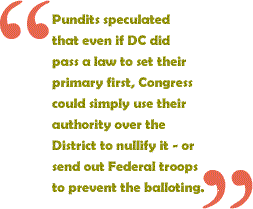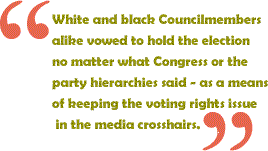
In
1964, a young man named Lawrence Guyot epitomized black America's
long struggle for the right to vote when he organized the Mississippi
Freedom Democratic Party to protest the state's all-white elections,
and its decision to send an all-white delegation to that year's
nominating convention in Atlantic City.
In
the face of violent resistance, Guyot and his party organized integrated
"freedom elections", elected their own delegates and fought
to be officially seated at the convention that renominated Lyndon
Johnson for President.
Flash
forward to the present day. Lawrence Guyot, an icon of the civil
rights movement, is still fighting for the right to vote. Guyot
lives in Washington, DC - the nation's first majority-black major
city, and currently the only place in the world where residents
of a democracy are not allowed a voice in the legislative body that
governs them.
The
nearly 600,000 residents of the District of Columbia are American
citizens who fight in wars (DC lost more casualties in the Vietnam
War than each of 10 states), pay Federal taxes and perform all the
other duties of American citizenship. Yet we are denied the right
to elect members of Congress to decide the laws under which we must
live and the ways in which our tax dollars are spent.
The
District has one non-voting Delegate to the U.S. House of Representatives
and no voice or vote in the Senate. To make matters worse, Congress
can even overturn our local laws and citizen-passed ballot initiatives.
The city also can't spend a dime of its own locally raised tax revenue
without first getting its budget approved by the Trent Lott crew
on Capitol Hill.
Though
the Constitution initially gave jurisdiction over District affairs
to Congress, there is  no
constitutional stipulation that District residents shall be denied
the right to voting representation in that body. But the root of
today's problem is this: for the better part of the last two centuries
there was an unspoken agreement in Congress that "authority"
over the District would be the purview of the violently racist Southern
segregationists who would chair its oversight committees. And we
all know that old habits die hard.
no
constitutional stipulation that District residents shall be denied
the right to voting representation in that body. But the root of
today's problem is this: for the better part of the last two centuries
there was an unspoken agreement in Congress that "authority"
over the District would be the purview of the violently racist Southern
segregationists who would chair its oversight committees. And we
all know that old habits die hard.
We
come now to the rapidly approaching 2004 presidential nominating
process and to Mr. Guyot, who will testify February 19th on a DC
Council bill to enable Washington, DC, a city where the black population
numbers over 60%, to host the first presidential primary in the
nation. The District is "allowed" to elect delegates to
presidential conventions and it can cast three electoral college
votes in the General Election. Yet the District's primary has always
been grouped with the last tier of states, and it always cast its
votes after the major party's nominees had been decided.
DC
Democracy Fund, a political action committee (PAC) formed in 2001
to donate funds to Federal candidates who support DC's right to
Congressional representation, launched a drive earlier this month
to make DC's long overlooked primary "first in the nation."
The solitary goal of DC Democracy Fund's campaign was to use the
primary to highlight for the country and its presidential aspirants
the civil rights violations faced by the disenfranchised residents
of our capital city.
The
activists foresaw an uphill fight, but one that just might force
the next President of the United States to outline his or her views
on "the voting rights question" before audiences in the
racially diverse neighborhoods that border our seat of government.
The
movement picked up steam. Within a week a bill had been introduced
by DCCouncilmember Jack Evans to hold the District's primary on
January, 10, 2004 - a full week before New Hampshire's tentative
date. Almost instantly, the entire 13 member Council and District
Mayor Anthony Williams signed on.
But
then the inevitable trouble began. New Hampshire's ultra-conservative
Manchester Union Leader ran a 1/19/03 editorial entitled,
"Worst in the Nation" which called the concept "unsavory"
and continued, "…we can't imagine a worse place to hold
America's first presidential primary." Then came the kicker:
a newspaper representing a state with roughly 7 black people for
every 1000 residents (.7%) stated, "In fact, there's probably
no other city in the country less representative of America than
Washington."
 A
regrettable war of words broke out between DC and New Hampshire
as the state's editorials began to roundly criticize the District.
Then the national parties chimed in with their expected threats
not to recognize any delegates elected in a primary held before
New Hampshire. Pundits speculated that even if DC did pass a law
to set their primary first, Congress could simply use their authority
over the District to nullify it - or send out Federal troops to
prevent the balloting. Many activists braced for city officials
to back off at the first sign displeasure from the big boys.
A
regrettable war of words broke out between DC and New Hampshire
as the state's editorials began to roundly criticize the District.
Then the national parties chimed in with their expected threats
not to recognize any delegates elected in a primary held before
New Hampshire. Pundits speculated that even if DC did pass a law
to set their primary first, Congress could simply use their authority
over the District to nullify it - or send out Federal troops to
prevent the balloting. Many activists braced for city officials
to back off at the first sign displeasure from the big boys.
But
things are somehow different in Washington this year. The city's
activists and politicians are fed up with 200 years of second-class
status and are asserting themselves in ways that would have previously
seemed unthinkable. Along with Evans, DC Council Chair Linda Cropp
(D) went on the radio and stated she would fight to hold the primary
regardless of opposition from Congress. "This is a local matter
that should be decided locally," Cropp said. "They may
be able to keep us (delegates) from being seated but they cannot
keep us from voting."
White
and black Councilmembers alike vowed to hold the election no matter
what Congress or the party hierarchies said - as a means of keeping
the voting rights issue in the media crosshairs. Then on January
27th New Hampshire Secretary of State Bill Gardner said he would
not move up his state's primary in order to leapfrog ahead of the
District.
As
a reason he cited the same legal loophole that had first piqued
the attention of DC voting rights activists: New Hampshire statute
mandates holding their primary before any other state. Since the
District is not a state, its early primary wouldn't conflict with
New Hampshire's guidelines. DC Councilmember Vincent Orange rapidly
scheduled a hearing to move on the "first in the nation"
primary bill.
"It
is forty years later now and I still lack voting rights simply because
I live in our nation's capital," Lawrence Guyot says anticipating
the hearing. "The fight that began in Mississippi in 1964 will
continue in DC in 2004. The District's primary is the perfect place
for both parties to tell us if there will be one definition of citizenship
in America or two."
Lawrence
Guyot and some DC colleagues from his 1964 civil rights crusade
will be first in line to testify at the hearing - and could repeat
history by fighting for disputed seats as convention delegates next
summer…
Sean
Tenner is Executive Director of the DC Democracy Fund, a Federal
Political Action Committee that launched Washington's "first
in the nation" drive and financially supports U.S. House
and Senate candidates who back full Congressional representation
for citizens of the District of Columbia. He can be reached at
[email protected] or at 202-549-6127.
The Fund's website is www.dcdemocracyfund.com.
Donations are always welcome!

Send
this page to a friend
www.blackcommentator.com
Your
comments are welcome. Visit the Contact
Us page for E-mail or Feedback.
Click
here to return to the home page

